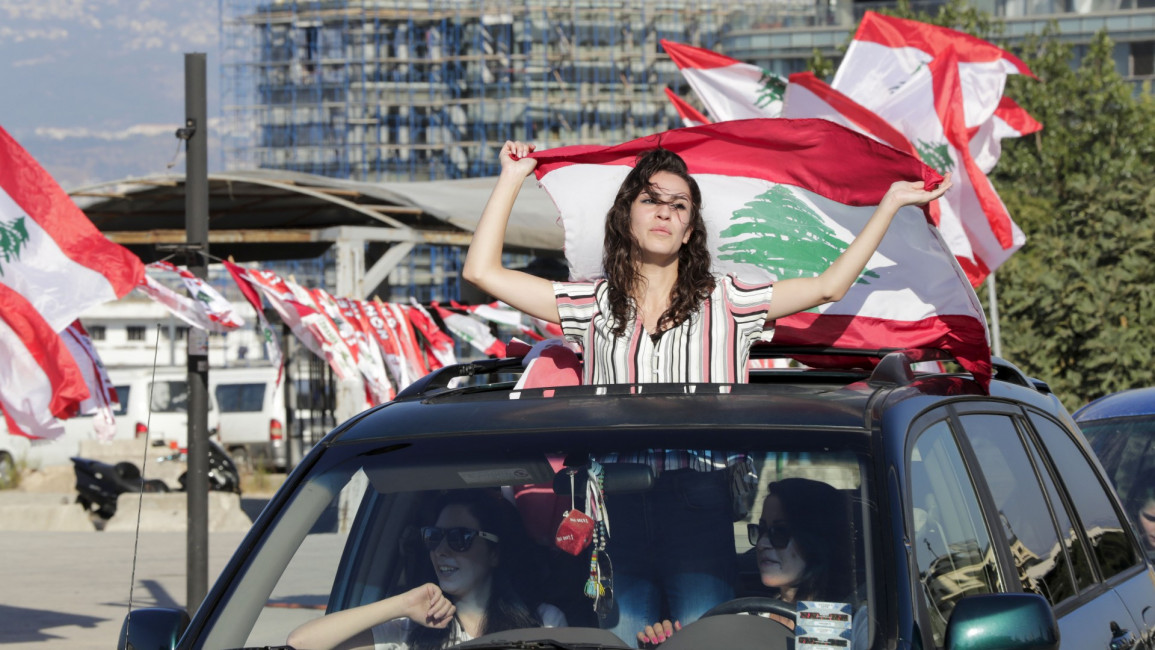Hundreds march in Lebanon to mark year of protests, amid coronavirus restrictions
Hundreds marched in Lebanon's capital Saturday to mark the first anniversary of a non-sectarian protest movement that has rocked the political elite but has yet to achieve its goal of sweeping reform.
A whirlwind of hope and despair has gripped the country in the year since protests began, as an economic crisis and a devastating August 4 port explosion pushed Lebanon deeper into decay.
Two governments have resigned since the movement started but the country's barons, many of them warlords from the 1975-90 civil war, remain firmly in power despite international as well as domestic pressure for change.
On Saturday, hundreds of people brandishing placards and Lebanese flags gathered in Martyrs' Square in the heart of Beirut in a scene reminiscent of last year's rallies.
Passing through the Hamra district, they marched towards the port -- the site of August's devastating explosion, which has been widely blamed on the corruption and incompetence of the hereditary elite.
There they will hold a candlelit vigil near ground zero at 6:07pm (1507 GMT), the precise time when a huge stockpile of ammonium nitrate fertiliser exploded, killing more than 200 people and devastating swathes of the capital.
Activists have installed a metallic monument at the site to mark the anniversary of their October 17 "revolution".
"For a year, we have been on the streets ... and nothing has changed," said Abed Sabbagh, a protester in his seventies.
"Our demand is the removal of a corrupt political class that continues to compete for posts and seats" despite everything happening in the country, he told AFP from Beirut's main protest camp.
'Deeply ruined'
The immediate trigger for last year's demonstrations was a government move to tax Whatsapp calls, but they swiftly swelled into a nationwide movement demanding an end to a system of confessional power-sharing that protesters say has tarnished pubic life.
The country's deepest economic downturn since the civil war has led to growing unemployment, poverty and hunger, pushing many to look for better opportunities abroad.
"Our government along with political parties crushed our hopes," said May, a 25-year-old university student.
"We are tired and deeply ruined, they left us no other choice but to leave."
|
A spiralling coronavirus outbreak since February prompted a ban on public gatherings but even without protesters on the streets public resentment has grown.
The explosion at Beirut port served as a shocking reminder to many of the rot at the heart of their political system.
It prompted protesters to return to the streets in its aftermath but the movement then shifted most of its energy to relief operations to fill in for what it sees as an absent state.
The political class has since failed to form a new government that can meet the demands of the street and international donors who have refused to release desperately needed funds.
French President Emmanuel Macron, who visited Lebanon twice in the aftermath of the port blast, said the country's ruling class had "betrayed" the people by failing to act swiftly and decisively.
'Daunting and difficult'
President Michel Aoun will hold consultations with the main factions in parliament next week before designating a new prime minister for the third time in less than a year.
Saad Hariri, who bowed out in the face of the first protests last October, is expected to make a comeback in an appointment that activists are likely to reject.
Aoun on Saturday renewed his call for protest leaders to work with the state -- an appeal repeatedly rebuffed by activists.
"My hand is still extended to you for us to work together to achieve the reforms demanded," he said.
"Reform is not possible outside the institutions of the state and it's still not too late."
The protest movement has maintained a loose structure that some analysts believe could be an impediment.
"The lack of political programmes and leadership have made the process and progress rather daunting and difficult," said Jamil Mouawad, who teaches political science at the American University of Beirut.
But academic and former minister Tarek Mitri said that the success of a protest movement "can't be measured by what has been achieved in terms of political change, nor by its ability to generate new political elites, but rather by the promises that it continues to carry, amidst all the pain."



